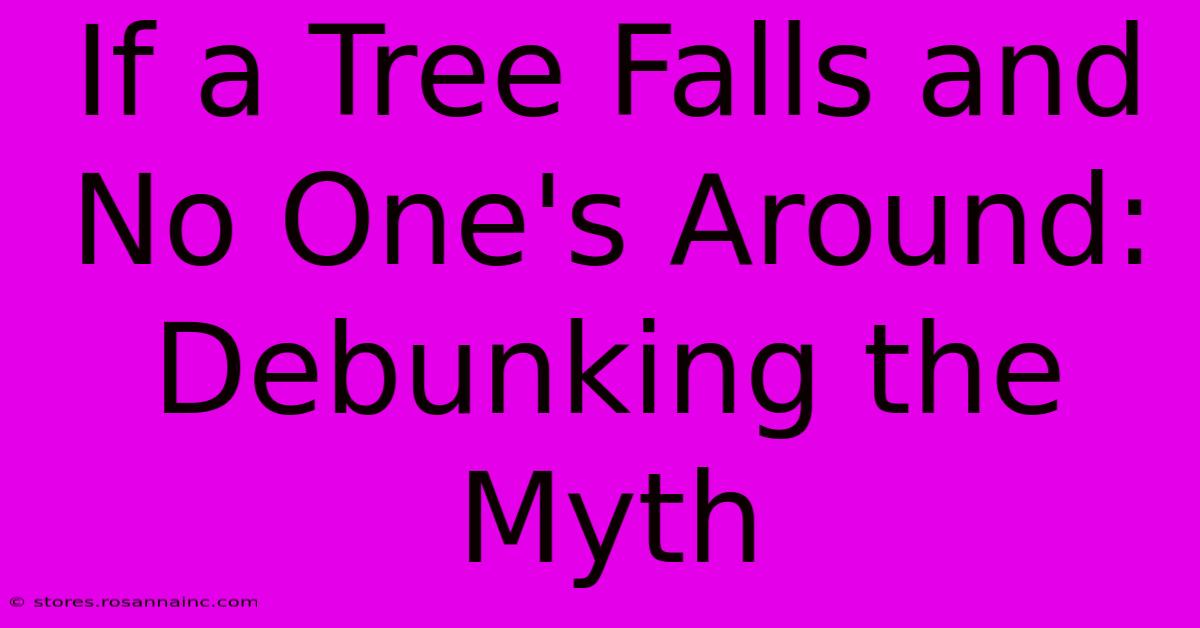If A Tree Falls And No One's Around: Debunking The Myth

Table of Contents
If a Tree Falls and No One's Around: Debunking the Myth
The classic philosophical question, "If a tree falls in a forest and no one is around to hear it, does it make a sound?" has puzzled thinkers for generations. The answer, however, is simpler than you might think, and hinges on a misunderstanding of the nature of sound itself. This article will debunk the myth and explore the science behind this age-old question.
Understanding Sound: More Than Just Hearing
The common misconception lies in equating sound with hearing. Sound, in its truest scientific form, is a form of energy produced by vibrations. These vibrations travel through a medium, such as air, water, or even solids, as waves. When these waves reach our ears, our brains interpret them as sound.
Crucially, the presence or absence of an observer doesn't affect the existence of these vibrations. Whether or not someone is there to perceive them, the falling tree still creates vibrations that propagate outwards.
The Physics of a Falling Tree
When a tree falls, its impact with the ground creates a disturbance. This disturbance generates vibrations that travel through the surrounding air, soil, and even the tree itself. These vibrations are the sound. These vibrations exist regardless of whether any living being is present to detect them.
The Role of Perception in the Question
The question's enduring appeal lies in its exploration of perception versus reality. While the physical phenomenon of sound—the vibrations—occurs regardless of observation, our experience of hearing that sound is entirely dependent on our presence.
Think of it this way: a radio station broadcasts signals constantly, even if no one is listening. The broadcast is the equivalent to the vibrations from the falling tree. The act of someone turning on a radio and hearing the broadcast is the equivalent of experiencing the sound.
The Philosophical Implications
Beyond the science, the question prompts discussions on the nature of reality and the importance of observation. Does something only truly exist if it's perceived? This delves into the realm of philosophy and epistemology, raising questions about subjective versus objective reality.
Moving Beyond the Myth
It’s time to put this age-old debate to rest. A falling tree, regardless of witnesses, undoubtedly produces sound in the form of vibrations. The question highlights a crucial distinction between the physical existence of something and our awareness of it. The sound exists, even if no one is there to hear it.
Conclusion: Science Trumps Philosophy (This Time)
The "if a tree falls" question is a great thought experiment, fostering discussions about observation and reality. However, scientific understanding clarifies that the sound waves are generated irrespective of an observer. The tree falling creates vibrations, which are sound, period. The myth is busted. Now, go enjoy the sounds of nature – with or without a philosophical pondering!

Thank you for visiting our website wich cover about If A Tree Falls And No One's Around: Debunking The Myth. We hope the information provided has been useful to you. Feel free to contact us if you have any questions or need further assistance. See you next time and dont miss to bookmark.
Featured Posts
-
Experience The Allure Of Swedesboro Nj United States
Feb 09, 2025
-
Unlocking The Mystery Gold Bar Weight Revealed
Feb 09, 2025
-
Is Your Knob And Tube Wiring A Time Bomb
Feb 09, 2025
-
Plain Bellied Water Snake Myths Debunked
Feb 09, 2025
-
Louise Enfant D Epinay Souffre
Feb 09, 2025
